| Major Required |
PHYS101 |
General PhysicsⅠ |
3-1-3 |
|
|
- Classification : Major Required
- Course No. : PHYS101
- Credits : 3-1-3
- Professor :
General Physics I and II introduce basic concepts of physics through lectures. General Physics 1 introduces physics for mechanics, heat effects, time and space, equilibrium of forces, Newton's law, momentum, energy conservation laws, motion under central force, rigid body, continuum mechanics, and waves. |
| Major Required |
PHYS102 |
General PhysicsⅡ |
3-1-3 |
|
|
- Classification : Major Required
- Course No. : PHYS102
- Credits : 3-1-3
- Professor :
General Physics II deals with the concepts of electromagnetism and optics
main topic is includes some of the basic concepts of quantum physics, including electric field and potential,current and magnetic fields, induction laws, dielectrics and magnetic material, electromagnetic waves, and optics
|
| Major Required |
PHYS103 |
General Physics Lab.Ⅰ |
0-2-1 |
|
|
- Classification : Major Required
- Course No. : PHYS103
- Credits : 0-2-1
- Professor :
Through experiments, this lecture help understand basic principles of general physics I. |
| Major Required |
PHYS104 |
Design & Build Physics Lab |
0-2-1 |
|
|
- Classification : Major Required
- Course No. : PHYS104
- Credits : 0-2-1
- Professor :
student-led type experiment class.
Based on the creativity of the individual which is out of the theoretical and abstract textbook-centered formal experiment class
this class designed process of designing, constructing, analyzing, demonstrating, The result presentation is the new paradigms of experimental process which students are actively involved.
|
| Major Required |
PHYS110 |
General Physics Recitation I |
1-0-1 |
|
|
- Classification : Major Required
- Course No. : PHYS110
- Credits : 1-0-1
- Professor :
Students improve their ability to take General Physics I and II through basic concept explanations, supplemental exercises, and questions / answers on the progress of General Physics I and II. |
| Major Required |
PHYS203 |
Mechanics |
3-1-3 |
|
|
- Classification : Major Required
- Course No. : PHYS203
- Credits : 3-1-3
- Professor :
Newtonian mechanics of particles and bodies are treated more analytically than the fundamental mechanics discussed in General Physics I.
Newtonian mechanics and conservation laws, gravitational potential, coordinate system problems, and center force problems.
|
| Major Required |
PHYS206 |
ElectromagnetismⅠ |
3-1-3 |
|
|
- Classification : Major Required
- Course No. : PHYS206
- Credits : 3-1-3
- Professor :
this lecture introduce physical phenomena of electromagnetism at a higher level than General Physics II.
The contents include magnetism and Maxwell equations such as charge and field, potential, conductor, Laplace equation and solution, magnetic field and vector potential, field energy.
|
| Major Required |
PHYS259 |
Physics LaboratoryⅠ |
0-6-3 |
|
|
- Classification : Major Required
- Course No. : PHYS259
- Credits : 0-6-3
- Professor :
through the measurement and analysis of fundamental physical properties, this lecture help understanding basic principles of physics
Topics include mechanics, electromagnetism, optics, and modern physics.
|
| Major Required |
PHYS351 |
Physics LaboratoryⅡ |
0-6-3 |
|
|
- Classification : Major Required
- Course No. : PHYS351
- Credits : 0-6-3
- Professor :
through the measurement and analysis of fundamental physical properties,
this lecture help understanding basic principles of physics
Topics include mechanics, electromagnetism, optics, and modern physics.
|
| Major Required |
PHYS301 |
Quantum Mechanics 1 |
3-1-3 |
|
|
- Classification : Major Required
- Course No. : PHYS301
- Credits : 3-1-3
- Professor :
Students will learn basic concepts of quantum physics including modern physics.
this lecture introduce application to simple systems, Particle and wave duality, uncertainty principle, wave function and Schroedinger equation, operator method, one dimensional problem, harmonic oscillator and hydrogen atom.
|
| Major Required |
PHYS302 |
Quantum Mechanics Ⅱ |
3-1-3 |
|
|
- Classification : Major Required
- Course No. : PHYS302
- Credits : 3-1-3
- Professor :
depend on basic concept of quantum mechanics
this lecture introduce basic concept of angular momentum, spin, perturbation, approximation, radiation theory
by the this concept this lecture help understanding basic atomic physics
|
| Major Required |
PHYS304 |
Thermal Physics |
3-1-3 |
|
|
- Classification : Major Required
- Course No. : PHYS304
- Credits : 3-1-3
- Professor :
This course deals with thermal and multibody phenomena based on statistical mechanics which probabilistically describes the physical properties of microscopic components such as molecules and atoms.
By learning the statistical phenomena of the physical world, we learn about heat and temperature
|
| Major Required |
PHYS307 |
ElectromagnetismⅡ |
3-1-3 |
|
|
- Classification : Major Required
- Course No. : PHYS307
- Credits : 3-1-3
- Professor :
by the using maxwell equation this lecture help understanding of electromagnetism
Combine Maxwell's equations to create wave equations
Use this combined wave equation to learn about electromagnetic fields, wave optics, special relativity theory, waveguide
|
| Select Major |
PHYS109 |
Introductory Modern Physics) |
1-0-1 |
|
|
- Classification : Select Major
- Course No. : PHYS109
- Credits : 1-0-1
- Professor :
Introduction to modern physics
Students will learn examples of modern physics research trends and applications of physics to help understand physics as a whole.
|
| Select Major |
PHYS201 |
Introduction to Quantum Physics |
3-1-3 |
|
|
- Classification : Select Major
- Course No. : PHYS201
- Credits : 3-1-3
- Professor :
introduction quantum mechanics
By focusing on the concept of quantum mechanics not a mathematical aspects, most students only familiar about classical mechanics will have an opportunity to learn quantum mechanical thinking
|
| Select Major |
PHYS202 |
Introduction to Relativity |
3-1-3 |
|
|
- Classification : Select Major
- Course No. : PHYS202
- Credits : 3-1-3
- Professor :
this lecture introduce the basic concepts of special relativity and general relativity. this lecture explore the basic concepts of detailed special relativity
after introduce about observation of various kinds of reference frame
this lecture introduce the basic concepts of general relativity after an introduction and Describe the physical phenomena related to black holes and provide a basic introduction to cosmology.
|
| Select Major |
PHYS209 |
Mathematical Methods for Physics |
3-1-3 |
|
|
- Classification : Select Major
- Course No. : PHYS209
- Credits : 3-1-3
- Professor :
this lecture introduce fundamental mathematical methodologies used in physics. Vector analysis, linear algebra, coordinate transformation, Fourier series, complex variables, ordinary differential equations, and special functions. |
| Select Major |
PHYS231 |
Physical measurement experiment |
0-6-3 |
|
|
- Classification : Select Major
- Course No. : PHYS231
- Credits : 0-6-3
- Professor :
Understand and practice basic electronics necessary for physics experiments.
Students will learn the ability to solve the problems that arise in real research by measuring the design, fabrication, measurement of basic electronic circuits characterization
|
| Select Major |
PHYS312 |
Computers for Physics |
2-2-3 |
|
|
- Classification : Select Major
- Course No. : PHYS312
- Credits : 2-2-3
- Professor :
It is an introductory course in physics using computers. Basic theories of computation, Numerical solutions of basic physical problems using various calculation method for computer. With an introduction to computer and computer simulations, we explore various interesting topics in physics using MATLAB's numerical analysis tools and graphical user environment. |
| Select Major |
PHYS351 |
Introduction to Astrophysics |
3-0-3 |
|
|
- Classification : Select Major
- Course No. : PHYS351
- Credits : 3-0-3
- Professor :
|
| Select Major |
PHYS352 |
Physics LaboratoryⅡ |
0-6-3 |
|
|
- Classification : Select Major
- Course No. : PHYS352
- Credits : 0-6-3
- Professor :
|
| Select Major |
PHYS360 |
Pioneers in Physics |
3-0-3 |
|
|
- Classification : Select Major
- Course No. : PHYS360
- Credits : 3-0-3
- Professor :
|
| Select Major |
PHYS399A-D |
Research Participation A/D |
0-3-1 |
|
|
- Classification : Select Major
- Course No. : PHYS399A-D
- Credits : 0-3-1
- Professor :
|
| Select Major |
PHYS401 |
Solid State Physics |
3-0-3 |
|
|
- Classification : Select Major
- Course No. : PHYS401
- Credits : 3-0-3
- Professor :
this class make understand of physical phenomena in solid
main topic is crystal structure, lattice vibration, electronic structure of metal, band theory, thermal property
|
| Select Major |
PHYS403 |
Nuclear and Elementary Particle Physics |
3-0-3 |
|
|
- Classification : Select Major
- Course No. : PHYS403
- Credits : 3-0-3
- Professor :
In terms of the ultimate structure of matter, we introduce the nuclear and elementary particles from a unified viewpoint according to the recently introduced theory.
this class introduce Quarks, small particles, fundamental properties of nuclei, nuclear forces, strong and weak interaction of small particles, symmetry and conservation laws
|
| Select Major |
PHYS406 |
Plasma Physics |
3-0-3 |
|
|
- Classification : Select Major
- Course No. : PHYS406
- Credits : 3-0-3
- Professor :
As an introduction to plasma phenomena, we deal with phenomena related to plasma in a magnetic field.
This course includes plasma vibration and equilibrium and stability in plasma
and this class include linear and nonlinear plasma theory, and diagnostic methods.
|
| Select Major |
PHYS407 |
Introduction to Accelerator Physics |
3-0-3 |
|
|
- Classification : Select Major
- Course No. : PHYS407
- Credits : 3-0-3
- Professor :
This class introduce structure and principles of linear accelerators and circular accelerators. this class Includes basic theories of particle beam physics. |
| Select Major |
PHYS408 |
Intermediate Mathematical Methods for Physics |
3-1-3 |
|
|
- Classification : Select Major
- Course No. : PHYS408
- Credits : 3-1-3
- Professor :
This class introduce structure and principles of linear accelerators and circular accelerators. this class Includes basic theories of particle beam physics. |
| Select Major |
PHYS410 |
Optical Physics |
3-0-3 |
|
|
- Classification : Select Major
- Course No. : PHYS410
- Credits : 3-0-3
- Professor :
this class introduce wave optics and quantum optics
this class introduce wave solution of maxwell equation, polarization, interference, diffraction, light-matter interaction, laser, holography, fiber optics
|
| Select Major |
PHYS412 |
Practical Physics Lab. |
0-6-3 |
|
|
- Classification : Select Major
- Course No. : PHYS412
- Credits : 0-6-3
- Professor :
The purpose of this course is to provide the students who major in experimental physics with the basic concepts and techniques of all kinds of machine
necessary for experimental physics.
Therefore, the contents of the curriculum include the ability to improve through the design process and the device production practice, and encourage students' creativity.
|
| Select Major |
PHYS413 |
Biological Physics |
3-0-3 |
|
|
- Classification : Select Major
- Course No. : PHYS413
- Credits : 3-0-3
- Professor :
This class introduce basic methodology of understanding life phenomena at the cellular level using physical methods. |
| Select Major |
PHYS420 |
Special Topics in Condensed Matter Physics |
3-0-3 |
|
|
- Classification : Select Major
- Course No. : PHYS420
- Credits : 3-0-3
- Professor :
this lecture is extend of solid state physics and Statistical physics
major topic is surface phenomena, many body theory, phase transition, Critical phenomenon, Non-equilibrium phenomena, complex systems, superconductivity, superfluid phenomena, semiconductors, polymer materials, and application of radiation field
|
| Select Major |
PHYS422 |
Special Topics in Modern Physics |
3-0-3 |
|
|
- Classification : Select Major
- Course No. : PHYS422
- Credits : 3-0-3
- Professor :
Introduce the latest theories of modern physics for undergraduate students
Difficulty level is adjusted according to student level.
Content is determined by the instructor.
|
| Select Major |
PHYS431 |
Physics ResearchⅠ |
0-6-3 |
|
|
- Classification : Select Major
- Course No. : PHYS431
- Credits : 0-6-3
- Professor :
this lecture help students have experience in theoretical and experimental physics under the supervision of a professor. Students are trained to present their research results through seminar and thesis. |
| Select Major |
PHYS432 |
Physics ResearchⅡ |
0-6-3 |
|
|
- Classification : Select Major
- Course No. : PHYS432
- Credits : 0-6-3
- Professor :
this lecture help students have experience in theoretical and experimental physics under the supervision of a professor. Students are trained to present their research results through seminar and thesis. |
| Select Major |
PHYS434 |
Physics Seminar |
3-0-3 |
|
|
- Classification : Select Major
- Course No. : PHYS434
- Credits : 3-0-3
- Professor :
The subject is assigned to the student under the supervision of the professor and the student discusses and present about it.
Students will be exposed to recent research topic in physics, and will be able to develop their interpretation experience and presentation skills.
|
| Select Major |
PHYS441 |
Internship Dispatch research Variable Credit (1 ~ 8) |
가변학점 (1~8) |
|
|
- Classification : Select Major
- Course No. : PHYS441
- Credits : 가변학점 (1~8)
- Professor :
Encourage undergraduate and graduate students to participate in research through international exchange internships and develop global research skills |
| Select Major |
PHYS460 |
Trends in Physics Research |
1-0-1 |
|
|
- Classification : Select Major
- Course No. : PHYS460
- Credits : 1-0-1
- Professor :
Seminar invited by Professor of Physics and External Scholars
This lecture introduces recent research.
This lecture will help understanding of trends in physics research in recent years. This lecture helps fourth-year students choose the direction of physics lectures (PHYS 431, 432).
|
| Major Required |
PHYS111 |
General Physics RecitationII |
1-0-1 |
|
|
- Classification : Major Required
- Course No. : PHYS111
- Credits : 1-0-1
- Professor :
Students improve their ability to take General Physics I and II through basic concept explanations, supplemental exercises, and questions / answers on the progress of General Physics I and II.
|










































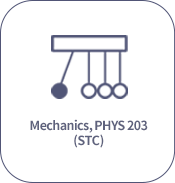


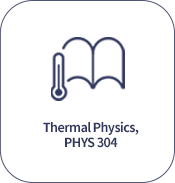
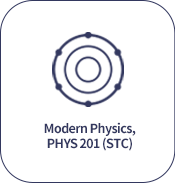

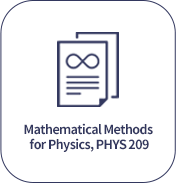
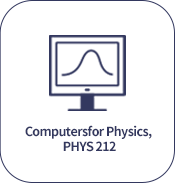

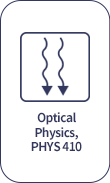
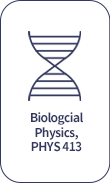

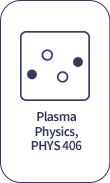

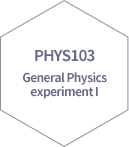
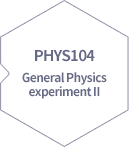
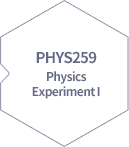
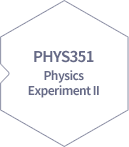
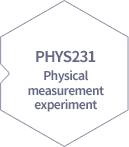

-2.gif)









 Login
Login


